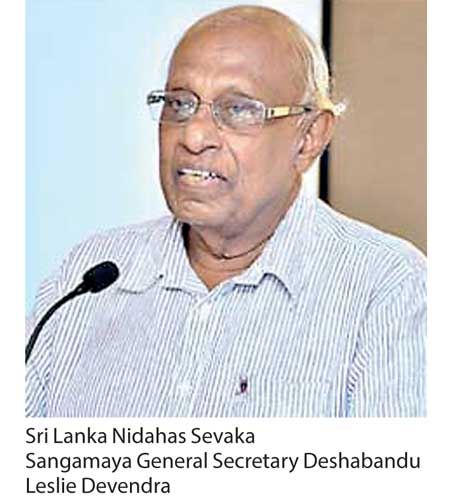Wednesday Feb 25, 2026
Wednesday Feb 25, 2026
Wednesday, 3 May 2017 00:00 - - {{hitsCtrl.values.hits}}
 One does not expect realistic economic policies to be pronounced by a trade unionist at a May Day Rally, where speeches are meant to garner support for the political party by pandering to the multitude. Contrary to such expectations, veteran trade unionist Deshabandu Leslie Devendra, General Secretary, Sri Lanka Nidahas Sevaka Sangamaya and the Presidential Director General for trade union activities, made two statements of vital significance for economic progress.
One does not expect realistic economic policies to be pronounced by a trade unionist at a May Day Rally, where speeches are meant to garner support for the political party by pandering to the multitude. Contrary to such expectations, veteran trade unionist Deshabandu Leslie Devendra, General Secretary, Sri Lanka Nidahas Sevaka Sangamaya and the Presidential Director General for trade union activities, made two statements of vital significance for economic progress.
Devendra said that that all what trade unions do are not necessarily correct: an unusual admission for a trade unionist. Some trade union actions he said are hampering foreign investments that are important for the country’s economic development. Furthermore, he said that there was a need to extend the age of retirement.
Devendra pointed out that foreign investments were needed for the country to progress economically and trade union objections and protests against several Government policies and foreign investments were not conducive to foreign investment. Trade union demonstrations, protests and strikes against various policies of the Government were hampering foreign investment in the country.
Foreign Direct Investments (FDIs) are needed for meeting the savings investment gap, improving the balance of payments, increasing exports and enhancing the technological and managerial capacities of the country. More FDIs would mean more employment. The rapid economic development of South East Asia is ample evidence of this.
Devendra’s contention that foreign investments are vital for economic development has been pointed out by economists for quite some time. The Unity Government too has accepted this. However foreign investments have slowed rather than increased in the last two years. This is because the investment climate in Sri Lanka is comparatively unattractive. There are many reasons for this, but trade union protests and obstructions have been one of them.
It must be also pointed out that trade union opposition have been on many issues that are of no direct concern to the particular trade  unions. The incessant strikes, demonstrations and protests are undoubtedly one of the reasons for the country receiving very little foreign direct investments. These demonstrations are publicised globally by media and well known to investors. Why would investors want to invest in a country that has so much of obstructionist activities, when there are more stable countries in other countries?
unions. The incessant strikes, demonstrations and protests are undoubtedly one of the reasons for the country receiving very little foreign direct investments. These demonstrations are publicised globally by media and well known to investors. Why would investors want to invest in a country that has so much of obstructionist activities, when there are more stable countries in other countries?
The second important issue addressed by Devendra was the need to extend the retirement age from 55 years for men and 50 years for women in the public service. As Leslie Devendra observed, this retirement age was fixed at a time when life expectancy was around 55 years. He said retirement this early meant that the services of many workers are lost to the country and that they languish at home for years without benefit to the country or to the household.
As Devendra pointed out, now that life expectancy has increased to the mid-seventies, we should increase the retirement age. He observed that developed countries have extended the retirement age with their life expectancy increasing.
When the initial proposition to extend the retirement age was proposed trade unions opposed it and it was shelved. They were perhaps quite ill-informed about the benefits of the proposed extension of the retirement age to workers. Trade unions should now be convinced of the need to extend the retirement age by about five years.
The extension of the retirement age would confer many benefits to workers and to the economy. This opposition to extend the retirement age has been owing to a lack of understanding of the issue. An extension of the retirement age to 65 years would place a lesser strain on pension schemes, could increase retirement benefits and would reduce the period during which retirement benefits would be needed to support retirees. The extension of the retirement age would reduce some of the financial problems of the ageing population.
Devendra›s pronouncement that foreign investments are vital for the country’s development would only be significant if it could reduce trade union opposition to such investment and mitigate harmful impacts that incessant demonstration have had on foreign investment and economic growth. Trade unions must be convinced of this and there should be a change in their obstructionist policies and a different attitude to foreign investments.
Otherwise it would be like unto good seed that has fallen on rocky sand and among thorns and unfertile soil. Will trade unions be more pragmatic in their policies?